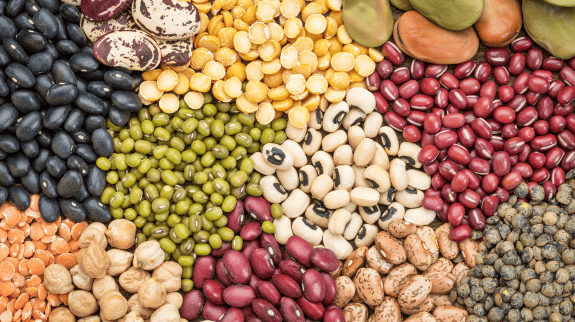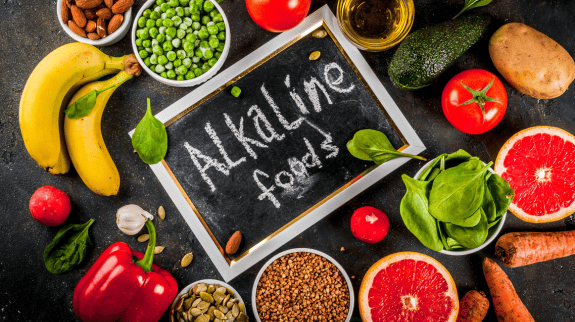High alkaline protein foods are gaining popularity among health-conscious individuals for their potential health benefits. These foods are believed to have a positive impact on the body’s pH levels, making it more alkaline and less susceptible to diseases. Consuming a diet rich in high alkaline protein sources can help promote overall health, better digestion, increased energy, and resistance to inflammation.
Understanding the importance of alkaline protein sources and their potential benefits is crucial for individuals aiming to improve their eating habits and maintain a healthier lifestyle. By incorporating these foods into your diet, you can enjoy a more balanced nutritional approach without compromising on your daily protein intake amount. With various options to choose from, you can easily experiment with different recipes and meal plans to create a personalized alkaline-rich diet.
KEY TAKEAWAYS
- High alkaline protein foods contribute to better health by balancing the body’s pH levels.
- Incorporating a variety of these foods into your diet promotes overall well-being and improved digestion.
- Exploring different high alkaline protein sources outside of protein powder allows for a customized and enjoyable eating experience.
Types of High Alkaline Protein Foods

When looking for high alkaline protein foods, it’s essential to know the difference between plant-based and animal-based sources. Both types of protein sources can provide valuable nutrients and contribute to a balanced diet.
Plant-Based Sources
Plant-based sources of alkaline protein are an excellent option for those following a vegetarian or vegan diet. Some common plant-based high alkaline protein foods include:
- Lentils and beans: These legumes are versatile, nutrient-dense, and can be used in various dishes such as salads, soups, and stews. They are rich in protein, with 100 grams of lentils providing up to 9 grams of protein. A substantial amount of daily protein requirements.
- Quinoa: This pseudo-cereal is not only alkaline but also a complete protein source, containing all nine essential amino acids. It can be used as a base for salads or a protein-rich side dish.
- Almonds: These nuts are not only a source of alkaline protein but also provide healthy fats and essential minerals like calcium and iron.
- Ezekiel bread: Made from sprouted grains and legumes, this bread is both alkaline and high in protein compared to many other bread types.
- Pumpkin seeds: These seeds are high in protein (up to 30 grams of protein for every 100 grams eaten) but they also offer other nutritional benefits such as magnesium and zinc.
Animal-Based Sources
While plant-based sources are often emphasized in an alkaline diet, certain animal-based protein sources can be included as well. Some common animal-based high alkaline protein foods are:
- Turkey breast: This lean source of protein might be a suitable inclusion in an alkaline-based diet.
- Shellfish: Rich in protein and other nutrients, shellfish like shrimp, clams, and mussels can be part of an alkaline meal plan.
Remember, maintaining a balanced diet with a variety of protein sources is essential for overall health.
How to Incorporate High Alkaline Protein Foods into Your Diet

Incorporating high alkaline protein foods into your diet can be simple and enjoyable. You can start by replacing some of your usual protein sources with plant-based options. Here are a few ways to eat more alkaline proteins:
1. Utilize legumes: Lentils and beans are nutrient-dense sources of alkaline protein that can be easily added to your meals. These versatile ingredients can be used in salads, soups, stews, and wraps.
2. Opt for plant-based protein powders: Adding plant-based protein powders to smoothies and shakes is an effortless way to boost alkaline protein intake.
3. Incorporate nuts into your meals: Almonds and walnuts are protein-rich nuts that can be sprinkled on yogurt, salad, cereal, and oatmeal or eaten as a snack on their own.
4. Focus on whole grains: Swap out your usual grains with alkaline-friendly whole grains like quinoa and brown rice to increase your alkaline protein intake.
5. Choose alkaline-friendly animal proteins: While most meats are acidic, you can incorporate moderate amounts of lean meats such as fish and poultry into your diet, as recommended by your dietitian or doctor.
To ensure a balanced and diverse diet, here’s a list of high alkaline protein foods to consider:
| Food Item | Protein Content (per 100g) |
|---|---|
| Chickpeas | 19 grams |
| Amaranth | 14 grams |
| Chia seeds | 16.5 grams |
| Spelt | 14 grams |
| Lentils | 9 grams |
| Almonds | 21 grams |
| Tempeh | 19 grams |
| Buckwheat | 13 grams |
| Pumpkin seeds | 30 grams |
| Spirulina | 57 grams |
Benefits of High Protein Alkaline Foods

High alkaline protein foods offer various health advantages, primarily due to the balance they offer between acidity and alkalinity. Consuming a diet rich in alkaline-forming foods is believed to help maintain the body’s pH levels, which may have a positive impact on overall health. Let’s explore some of the key benefits of incorporating high alkaline protein foods into your diet.
Improved kidney function: Research has shown that alkaline diets, which include foods such as lentils and beans, can help protect the kidneys. These alkaline protein sources may aid in reducing the risk of developing kidney stones and other serious kidney disease-related issues by lowering acid levels in the body.
Stronger bones: Consuming alkaline-forming foods can contribute to better bone health. A more alkaline environment in the body might promote stronger bones by preserving bone mass and reducing the risk of osteoporosis. Foods like green leafy vegetables are particularly beneficial, as they are high in both alkaline content and essential nutrients for bone health.
Increased energy levels: Adopting an alkaline diet can also lead to higher energy levels. Alkaline-forming foods, as opposed to acid-forming foods (processed foods or foods with a PH above 7), tend to be nutrient-dense and promote better absorption of essential nutrients. This translates to enhanced energy and an overall feeling of well-being.
Weight management: Diets that incorporate more alkaline forming foods and protein foods may support healthy weight management. These foods are typically lower in calories and contain fewer processed ingredients, which can contribute to maintaining a healthy weight. Furthermore, alkaline-forming foods tend to promote better digestion and nutrient absorption, making it easier for the body to process and utilize the energy derived from these foods.
Potential Side Effects of Consuming Too Much Alkaline Food

While alkaline foods are generally considered healthy foods and consuming them is not a bad thing, it is essential to maintain balance in our diet. The primary concern with consuming too much alkaline food is the potential disruption of the body’s natural pH balance, leading to imbalanced nutrition and unhealthy body functioning.
Overconsumption of alkaline foods may lead to a decrease in stomach acid production. Stomach acid is crucial for proper digestion and the absorption of nutrients. Inadequate stomach acid can cause indigestion, bloating, and nutrient deficiencies, as our bodies struggle to break down and absorb essential nutrients correctly.
Another possible consequence of excessive alkaline food intake is the development of electrolyte disturbances. Essential minerals like calcium, magnesium, and potassium help maintain the body’s acid-base balance. Consuming too many alkaline foods can interfere with this balance and lead to irregular heartbeats, muscle weakness, and other complications.
It’s also important to consider the side effects of high-protein diets that often accompany alkaline food consumption, which may include dehydration, nausea, and headaches. However, this research has found limited evidence, so additional investigations are required to determine the risks.
Acid Forming Foods

Acid-forming foods, often associated with an acidic pH level above 7, should be consumed in moderation as part of a balanced diet. These foods typically include processed items, sugary snacks, and some animal proteins.
While our bodies naturally maintain a slightly alkaline pH, excessive consumption of acid-forming foods including processed foods can potentially disrupt this balance and lead to health issues over time.
Conclusion
In summary, incorporating high alkaline protein foods into one’s diet can be both satisfying and beneficial for overall health. These protein sources not only help in maintaining a more alkaline body pH but also support a healthy lifestyle.
Alkaline diets emphasize the consumption of whole foods, including fruits and vegetables, and may lead to some positive health benefits. Although there is debate surrounding the effectiveness of alkaline diets, it’s important to remember that focusing on a balanced and nutritious diet should always be the primary goal.
Adopting a dietary approach that highlights alkaline foods can be a sustainable choice. Remember to also incorporate other essential nutrients, paying attention to individual needs and preferences. By emphasizing a more balanced and holistic approach to nutrition, it’s possible to achieve a healthier and more satisfying lifestyle.
By keeping a confident, knowledgeable, neutral, and clear tone, it’s essential to acknowledge that each person’s dietary requirements and preferences may differ. However, considering the addition of more alkaline foods can be a step toward a more balanced and nutrient-dense diet.
Frequently Asked Questions
What are the top plant-based high alkaline protein sources?
Some of the top plant-based high alkaline protein sources include lentils, beans, quinoa, and almonds.
How can I incorporate high alkaline proteins into a vegan diet?
Incorporating high alkaline proteins into a vegan diet is relatively simple, as many plant-based foods are already alkaline. Some examples include incorporating chickpeas into salads or stews, using quinoa as a base for grain bowls, and adding chia seeds to smoothies or oatmeal. Additionally, many leafy green vegetables, like kale and spinach, contribute alkalinity and protein to a vegan diet.
What are some low acidic alternatives to common protein sources?
Low acidic alternatives to common protein sources include nuts and seeds, such as almonds and chia seeds, as well as vegetables like kale and broccoli. Replace processed meats and dairy with these foods to maintain a more alkaline diet. Opt for plant-based milks like almond or hemp milk instead of dairy milk, and use nut butters as spreads instead of cheeses.
Which alkaline grains are also high in protein content?
Quinoa is an alkaline grain that is also high in protein content, with roughly 8g of protein per cooked cup. Additionally, other alkaline grains like teff, millet, and wild rice can offer moderate protein levels while keeping the body’s pH balance more alkaline.
How does raw sprouted protein powder compare to other alkaline protein sources?
Raw sprouted protein powder is made from the sprouted seeds and grains, which increases the nutrient density and bioavailability of the protein. These powders can be advantageous in a high-alkaline diet as they are easy to digest and offer a concentrated protein source. However, it’s essential to consume a variety of protein sources for a balanced nutrient intake.
Are there any high protein alkaline food combinations for optimal nutrition?
Yes, there are several high protein alkaline food combinations for optimal nutrition. A popular example is the combination of beans and brown rice, which together provide all essential amino acids. Additionally, quinoa salads with plenty of leafy greens, nuts, and seeds offer a high protein and high alkaline meal. Smoothies containing plant-based protein powders, nut butters, and leafy greens can also provide a well-rounded source of alkaline nutrition.

